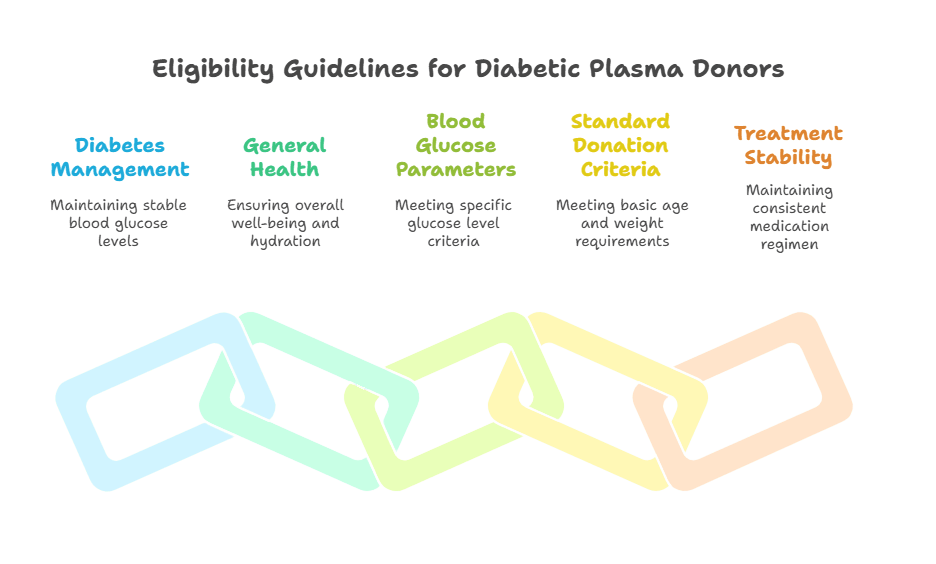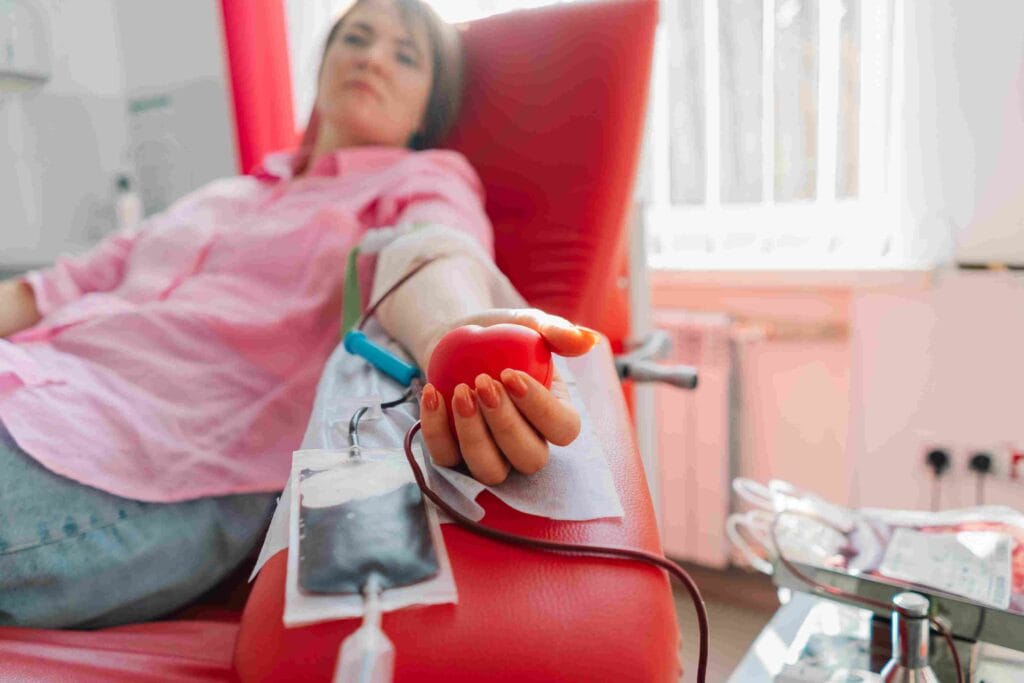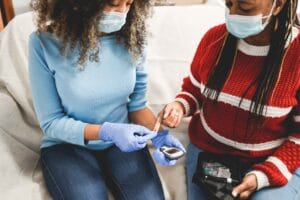
Table of Contents
Introduction
Can diabetics donate plasma? Yes, in general people with diabetes are eligible to donate plasma, but they must meet certain criteria. If you have they and so desperately want to save others by donating, this is an encouraging message.
It’s a life and death need: with every passing day, thousands of patients rely on plasma donations to stay alive. This life-saving fluid is needed for treating trauma patients, immune conditions, and a host of other critical conditions. But for the millions of people with diabetes who would like to help out in this important effort, questions of eligibility frequently arise.
But the reality is most Type 1 and Type 2 diabetes patients should typically qualify to be plasma donors. Hospitals now realize that well-managed diabetes isn’t the same as complex, unstable diabetes, and doesn’t mean simply that a person cannot be a good donor. Your condition alone should not be reason enough to prevent you from making this meaningful contribution that can save lives.
Consider the transformative power of your contribution. Your plasma could be used to help a burn victim heal, assist an individual fighting a rare disease or even save a trauma patient in the emergency room. If you’re an expert in living with a chronic illness, you can empathize with how crucial modern medicine can be and play an active role in people’s lives for the better with the consent of the value provider.
In this post, we’ll cover exactly what diabetics need to know before donating plasma, including who is and isn’t eligible, how to prepare, and what to expect when donating. Whether you’ve been living with diabetes for years or were just recently diagnosed, you’ll meet others like you and learn how you can safely join the donor community and save thousands of lives each day.
Diabetes and Donation: What is “Well-Controlled”?
Diabetes interferes with the way your body processes glucose and can result from your body’s inability to make insulin (a hormone that regulates blood sugar) or to use the insulin that it makes effectively. This causes high levels of sugar in the blood which can harm organs and systems of the body.
Types of Diabetes and Distinctions Between Them
Type 1 Diabetes
- An autoimmune disease in which the pancreas secretes little or no insulin.
- Most often diagnosed in childhood or adolescence
- Needs insulin treatment for the rest of their life
Type 2 Diabetes
- Body becomes resistant to insulin or does not produce enough of it
- Commonly occurs in adults but now appears to be occurring in the young as well
- Regularly controlled through diet, exercise, oral medications, or insulin
And there’s prediabetes, where blood sugar is higher than normal but not quite high enough for a diagnosis of diabetes. An estimated 96 million American adults have prediabetes, the C.D.C. says, and many of them can prevent a diagnosis of Type 2 diabetes through lifestyle changes.
The Vital Role of “Well-Controlled” Diabetes in Donation
“Controlled” diabetes isn’t nearly good enough for plasma donation centers There are actually a few very good reasons why plasma donation centers don’t take anyone with well-controlled diabetes.
Donor Health: Uncontrolled diabetes makes individuals 2.7 times more likely to experience adverse post-donation events, such as dizziness, fainting or hypoglycemia, published in the Journal of Blood Medicine ).
Quality of Plasma: Abnormally elevated glucose levels in the blood may result in structural changes of plasma proteins, which may affect therapeutic efficacy in recipients, according to a 2022 study in Transfusion Medicine Reviews.
Recipient Safety: Donor centers adopt these policies in accordance with the FDA to protect collected plasma so it is safe and of high quality.
What is meant by “well controlled” diabetes? Generally, centers look for:
- HbA1c levels below 7.5%
- No major diabetes-related complications
- Stable medication therapy for 6 months or more
- No recent episodes of severe hypoglycemia or hyperglycemia.
And if you ca practice good diabetes management by taking your medications regularly, keeping up with your monitoring, and making healthy lifestyle choices, then you’ll be taking care of yourself and be on the path to potentially being eligible to donate plasma to help save lives – such as participating in the 10,000 units of plasma that are needed daily for lifesaving treatments being performed across the US.

Key Eligibility Guidelines for Diabetic Donors
When it comes to donating plasma with diabetes, several separate factors will help determine your eligibility. Knowing these needs can be a great way to prepare ahead of time when visiting a donation center.
Good Diabetes Management: The Pre-requisite for Qualification
The key is well‑controlled diabetes history-based qualification. This means:
- Steady blood glucose levels in the correct range for you
- You should also check your levels regularly
- As I couldn’t afford to eat it every day for breakfast and nothing else, I had to follow your treatment plan
- No major diabetes related complications
General Health Requirements
In addition to managing diabetes, donors should be:
- Overall health of the donor at the time of donation
- Without acute illness or infection
- One must not have any diabetes complications
- Decently hydrated and well slept
Blood Glucose Parameters
Stable blood sugar is better for donation security:
- Most centers require fasting glucose between 70-180 mg/dL on donation day
- HbA1c levels generally below 7.5% (some centers may accept up to 8.5%)
- No episodes of severe hypoglycemia or hyperglycemia in the previous 3 months
Standard Donation Criteria
You’ll also need to meet the same basic requirements as all donors:
Age Requirements
- Minimum age of 18 in most states (17 with parental consent in some locations)
- Some centers may require diabetic donors to be at least 19
Weight Requirements
- Minimum weight of 110 pounds (50 kg)
- Weight proportional to height for younger donors
- BMI considerations may apply at certain centers
Treatment Stability
Your diabetes needs to be well managed:
- No major modification of the medication in the 4-6 weeks period
- If insulin-dependant, no change in regiment for at least 6 months
- No recent hospital treatment for diabetes
Remember there, these conditions protect both you and prospective guests. Always check with your health care provider when you donate plasma to ensure that it is safe for you given your personal health situation.
Medication and Eligibility: Insulin vs. Oral Meds
When donating plasma, the medication you take to control your diabetes will determine whether it disqualifies you from donating. Knowing these drug-specific needs could save you time and frustration at donation sites.
Insulin Users: Differing Rules
The determination of eligibility of insulin-dependant diabetics remains one of the most non-uniform areas among the donation agencies:
- Some centers ban even insulin users : The Irish Blood Transfusion Service (IBTS) and several European agencies, for example, specifically prohibit people on insulin from donating blood or plasma, ostensibly out of a concern for donor health.
- Some groups do allow insulin users: The American Red Cross as well as many U.S. plasma centers accept insulin-dependent donors as long as their diabetes is well-controlled and steady.
However, a study published in Transfusion Medicine (2019) reported no significant differences in quality indicators between the plasma of well-controlled insulin using donors compared to those of non-diabetic donors, validated by a growing number of centers with no longer strict policy in accepting plasma from insulin-treated donors 23.
Oral Medication Users: Generally More Accepted.
Individuals controlling diabetes with oral medications usually have more leeway:
- Metformin users: Generally eligible at most donation centers
- Sulfonylureas (glipizide, glyburide): Usually acceptable with stable dosing
- SGLT2 inhibitors: May require additional screening at some centers
- GLP-1 receptor agonists: Policies vary by specific medication
A 2021 study in the Journal of Clinical Apheresis that looked at donation data from 1,247 diabetic plasma donors found that oral medication users experienced bad donation reactions at similar rates as the non-diabetic donors (1.8% vs. 1.6%) his team notes.
Medication Stability Requirements
Irrespectively of the type of medication:
- Normally doses need to be stable for at least 1-3 months
- Only medications were not significantly changed within the last 6 months
- Stable control of blood glucose on present therapy
Advice for Would-Be Donors
- Call ahead to confirm the policy of your specific center regarding your medication.
- Arrive at your screening with a complete list of all medicines and dosages.
- Feel free to ask for a medication eligibility pre-check before your appointment to donate.
About 28% of diabetics are being treated with insulin, according to the American Diabetes Association. Be sure to check the current policies at your local donation center as protocols change with new research.
Diabetes Complications and Deferral
Although most people with diabetes are eligible to donate plasma, some complications of the condition can result in temporary or permanent deferral. Knowing these possible barriers can prepare you to screen appropriately and set expectations.
Deferrals for complications
Donation centres usually screen for certain diabetes complications that may compromise donor’s safety or the quality of plasma:
Microvascular Complications
- Diabetics Retinopathy: Advanced disease in eye may lead to deferral
- Diabetic Nephropathy : Sometimes the patient will be disqualified for kidney problems.
- Diabetic Neuropathy: individuals suffering from severe nerve disease may be ineligible for donation
Macrovascular Complications
- Recent cardiovascular events (heart attack, stroke)
- Peripheral vascular disease with significant symptoms
- Uncontrolled hypertension alongside diabetes
Symptoms That May Prevent Donation
In patients without known complications: even in the absence of complications, some symptoms of poor control of diabetes may result in temporary deferral:
- Frequent episodes of hypoglycemia (low blood sugar)
- Recent instances of diabetic ketoacidosis
- Persistent symptoms including:
- Excessive thirst or frequent urination
- Unexplained fatigue or weakness
- Recurrent lightheadedness
- Unintentional weight loss
A1c Considerations
Your glycated hemoglobin (A1c) level serves as an important metric:
- For standard donation: Most centers require A1c below 8.0%
- For optimal eligibility: A1c below 7.0% aligns with clinical guidelines
- For research programs: Some specialized research donations specifically seek donors with higher A1c levels
Verification Requirements
Donation centers are serious about these regulations and they may:
- Need proof of you (or your dependent’s) diabetes diagnosis
- May obtain clearance letter from a physician for some complications
- Could test more than just the donors screen for
And trust that deferrals are used first and foremost for reasons of safety. If deferred, inquire why and what could change to enable you to donate in the future. Most problems, when managed correctly, do not rule you out for life from helping others with plasma.
Diabetics and the Donation Process: What to Plan For
For people living with diabetes who are looking to donate plasma, knowing what to expect can help make the process go more smoothly. The basic steps in donating are mostly the same across all donors, but diabetes patients may have some unique aspects to consider.
Pre-Donation Screening
You will complete a thorough screening before donating:
- Health Questionnaire You’ll fill out a thorough form about your medical profile, medications and recent health.
- Disclosure of Diabetes: Things to be ready to share:
- Diabetes type (Type 1 or Type 2)
- Duration since diagnosis
- Current treatment regimen
- Recent blood glucose readings
- Any complications that were related to diabetes
Medical Examination
A quick check-up will then take place:
- Medical Information: Record date and times of blood pressure readings, resting pulse rate, temperature, and weight measurements
- Blood Sugar Check: They are going to double check your blood sugar now
- Hemoglobin Test: A little finger prick to make sure you are getting enough iron
- Physical Examination: Perfunctory evaluation for any complications
The Donation Experience
Next the recommended donation process after you are cleared:
- Preparation: You will lie comfortably on a donation bed adapted for the purpose.
- Site Selection: The phlebotomist will determine the best vein for puncture
- The Draw: Blood is drawn for plasma donation, the plasma is separated and the remainder returned to your bloodstream
- Monitoring: Staff will monitor you periodically, paying attention to symptoms of hypoglycemia or other issues.
Time Commitment
What to be ready for:
- Check-in and Registration for Screening: 15-20 minutes
- Donations:Plasma: taking between 1 hour to 2 hours for the collection process
- Post-Donation Recovery: 10-15 minutes for observation
Special Considerations
- If you start to feel lightheaded, donation beds are able to elevate your feet
- Trained staff focused on helping diabetic donors
- Bring a small snack if your donation is after meal times to keep your blood sugar.
- It is crucial to hydrate before, during and after donating.
Keep in mind that each donation center is going to have slight differences in their procedure, so you don’t hesitate to call ahead with specific questions regarding their system for donors with diabetes.
Preparing for Donation: Tips for Diabetics
For those with diabetes who are looking to donate plasma, preparation can make a big difference to how the experience goes and if you even are able to donate at all. These helpful tips will ensure your donation day is hassle free.
First and Foremost: Hydration
It is especially important for diabetic donors to maintain adequate levels of hydration:
- Begin drinking extra water 24-48 hours before your appointment
- Aim for at least 8-10 glasses of water the day before donating
- Continue hydrating the morning of your donation
- Avoid or limit dehydrating beverages like:
- Coffee and caffeinated teas
- Alcohol (avoid completely for 24 hours before donation)
- High-sugar sodas that may affect blood glucose
This could mean than then donation is more efficient (Rapid donations = less time spent on the machine) and that you may get a larger volume of plasma than if you were under-hydrated.
Nutrition Strategy
What you eat before you donate makes a big difference:
- Eat a balanced meal 2-3 hours before your appointment
- Include protein sources like eggs, lean meat, or legumes
- Incorporate iron-rich foods such as spinach or fortified cereals
- Choose complex carbohydrates for stable blood sugar
- Avoid unusually heavy, greasy, or sugary foods
Blood Sugar Management
Be especially attentive to your levels of glucose:
- Monitor more frequently in the 48 hours before donation
- Record your readings to show stability if requested
- Aim for readings within your target range on donation day
- Follow your regular medication schedule unless advised otherwise by your healthcare provider
Rest and Activity Balance
Get enough sleep Sleep and being well rested will help you donate:
- Get at least 7-8 hours of sleep the night before
- Avoid strenuous exercise or physical labor on donation day
- Plan for a relaxed schedule afterward if possible
Documentation Preparation
Be ready with these things before you arrive:
- Valid photo identification
- Current medication list with doses
- If available, recent lab work results (A1c, etc.)
- Your diabetes diagnosis documentation, if this is your first time attending.
With these ready, you are most likely to donate successfully as well as safeguard your own health as primary importance.
After Donation Care for Diabetics
After you’ve donated plasma, it’s important to take care of yourself, especially if you have diabetes. Your body will need time to heal and you will have to closely monitor your blood glucose levels during this time. Kicking Back At The Donation Center Take some time to relax at the donation center before you leave, and enjoy those snacks and drinks set out – they’re there for a reason.
It is especially important in the 24 -48 hours after donation to monitor your blood sugar level. Most reward donors with diabetes observe increasing or decreasing blood glucose levels after donating plasma. This is because your body is busy replacing the volume of fluid and the type of proteins that were removed through the donation process, which can temporarily affect how your body deals with your insulin and glucose. You will need to monitor more often than you are used to, and shouldn’t be surprised if your overall management plan needs a few tweaks.
The timeline for recovering is depends on what you are donating. It can be useful to know that your plasma volume will return to normal pretty quickly (24-48 hours), but if you’ve donated whole blood, think about how long it will take for if your red blood cells make the time to regenerate, which is a longish, longish time — 10-12 weeks to be exact. This is why you can only give whole blood every 8 weeks – for most people.
Distributors and diabetics need to pay attention to the affect on HbA1c test. Blood or plasma donation within the past few months can disrupt your HbA1c results for a period of up to 2-4 months. Make sure that you let your physician know about your donation history whenever you get scheduled for diabetes-related lab work, so that the results are interpreted accurately.
Curiously, the literature does suggest that male donors with diabetes may have a temporary improvement in glucose tolerance after blood donation (9,28), but this finding is too inconsistent to be considered therapeutic. Drink plenty of fluids, eat well balanced meals, and lay low for 24 hours (shouldn’t be doing anything crazy anyway). If you have unusual symptoms such as persistent dizziness, inability to maintain stable blood sugar levels, or extreme fatigue, you should call the donation center and your doctor for advice.

PLEASE NOTE: Eligibility Rules Differ!
You see, when you think about donating plasma with diabetes, one very important truth reigns supreme: eligibility standards can vary widely depending on where you try to donate. In all of the material below, please keep in mind that that the information provided is based on the general standards, but each donation center has its particular set of standards and interpretations.
(Note: these differences do arise for several good reasons. Specific policies for donors with diabetes are part of center protocols that providers develop based on the medical director’s training and experience in handling diabetic donors. Some centers err on the side of caution when it comes to potential risks, while others have revised their policies in light of recent studies that demonstrate the safety of accepting some diabetic donors. Moreover, national regulators including the FDA create minimum requirements, however, organizations can also exceed these minimums based upon their own requirements.
The variability in insulin administration may be best illustrated by insulin usage. Some donation centers categorically refuse all insulin-dependent diabetics, while others accept them depending on whether their disease is sufficiently well-regulated. Comparable divergences are held for acceptable HbA1c levels with some centers tending to use a cutoff of 7.5% and others allowing levels of 8.5% or greater.
There’s also a huge regional divide in who is and isn’t qualified. The circulatory support of active EVD cases may vary between countries among different regions in the same country, with the European blood service standards sometimes differing from North America’s requirements, and rural and urban areas within a country have different protocols depending on the availability of resources.
Because of this variability, online research is a rule-of-thumb guidance not a definitive answer. The only way you will be able to find out for certain about if you are eligible to donate plasma is by speaking to your own donation center. A trained medical professional will assess your situation, review your diabetes control, and have the final say on any donations. Be sure to always call in advance to confirm what’s needed before you plan a visit to donate.
What to Do Next: Contact Your Local Center & Physician
Having been informed of the general rules of the road concerning plasma donation as a diabetic, your path forward should personally tailored. Doing these things can help determine if donation is right for you.
Contact Your Local Donation Center
The single best source of information is your direct link to the facility where you’re planning to donate:
- Call their eligibility department directly rather than relying solely on website information
- Ask specifically about their policies for donors with your type of diabetes
- Inquire about any documentation they may require, such as:
- Recent lab work results
- Physician clearance letter
- List of current medications
Many centers have eligibility specialists who can pre-screen you on the phone, meaning you could make a wasted trip if you don’t meet their specific criteria.
Schedule a Consultation with Your Healthcare Provider
Your diabetes care team is key to this decision:
- Discuss your interest in plasma donation during your next appointment
- Review your recent lab results and diabetes management together
- Consider how donation might impact your specific health situation
- Ask about any medication adjustments that might be needed on donation day
Relevant Medical Considerations
How to prepare for donation:
- Do not stop or change the dose of your prescribed medication without your doctor’s guidance
- Do not try to alter treatment temporarily just for the sake of being a donor.
- If it is currently not possible, inquire what could change that would allow you to donate in the future
Making Your Final Decision
With professional counseling from your healthcare provider and the donation center, you can make the best decisions to serve both your health and your willingness to help others. Keep in mind other ways to volunteer aside from donation if it’s not a fit for you at this time.
By doing this, you are not only being responsible for your own health, but also for the health and safety of those who may someday receive your plasma — and that’s a generous spirit that gets to the heart of why you’re interested in donating in the first place.
Your Impact - Why it Matters if you Donate
The Impact of Donating Plasma as someone with Diabetes When you decide to donate as someone with diabetes you are providing a helping had of healing that can reach beyond ➡ what you may ever know. Every time you donate (around 600-800ml), you give away proteins, antibodies and clotting factors which cannot be produced artificially, and your donation becomes unique and irreplaceable in today’s medicines.
Your passing on a gift becomes a vital line of support for several recipients facing life-threatening health conditions. Plasma-derived albumin helps treat burn patients, who need to balance fluids and heal tissue damaged by fire. Patients with immune deficiencies are given immunoglobulins from plasma which enhance their ability to fight off infections they would otherwise be unable to overcome.
People with bleeding conditions like hemophilia are supposed to rely on clotting factors obtained from plasma to avoid dangerous hemorrhages. Aggressive treatments for cancer patients drain the body of a wide range of plasma components and even then, such patients may need new components to counteract the side effects of treatment As they are developing systems, premature infants may also need access to a broad spectrum of plasma products to help them to function correctly.
With the exception of getting paid, there are several benefits beyond treatment for collecting plasma from well-controlled diabetics. Researchers investigating diabetes rely on donated plasma to devise new tests for diagnosis, to learn how diseases work, and to develop better treatments. Your donation could help researchers understand better the very condition you have to deal with, now that’s a worthy cycle of give and take when it comes to diabetes care.
The gesture is especially meaningful when it comes from someone living with a chronic condition such as diabetes. It’s a sign of not just generosity but resilience — that just because you live with diabetes doesn’t mean you can’t make a major contribution to another person’s health. Every time you reach out to donate, you are involved in one of the most direct expressions of compassion that medicine offers: Sharing the stored abundance of well-managed health with others in desperate need. This link between your own health story and somebody else’s life saving experience makes for a legacy of influence that lasts long after your life in a donation chair is over.

🚀 Ready to stabilize your blood sugar? Gluco Shield Pro is here! Feel your best every day with this powerful, all-natural formula. Click here to discover your path to balanced health!🌱
Conclusion
Just because you have diabetes does not mean you can’t take part in one of healthcare’s most valuable offerings: plasma donation. As we’ve covered above in this post, many individuals with well-controlled diabetes can donate plasma safely and go on to help others in need of such life-saving therapies.
The one important thing to remember, though: Your diabetes status does not automatically make you ineligible to donate. But the most important factor by far is not the disease’s presence or absence; rather it’s how well you’re controlling the condition, what medications you’re taking and whether you’re free from various complications. With the proper preparation, monitoring and aftercare, donating plasma can be a regular part of how you give back to your community.
Keep in mind that criteria for the donation differ from between donation centers and contact with your local center is key. By collaborating with both the staff at the donation center and your health provider, it helps to ensure you’re making the safest decision for you and the donation recipients, and making the most of your ability to help others.
For those who are eligible, the payoff is incalculable — the knowledge that your plasma could help those with burns recover, boost the immune systems of patients with debilitating conditions, or deliver life-saving medications to literally millions of others suffering from serious health issues. Even if you are not currently eligible, remaining active in your diabetes management might result in becoming eligible in the future.
Newly diagnosed or years into managing your diabetes, we hope that this guide has helped explain the journey to plasma donation and has encouraged you to consider this impactful way to get involved. Your experience of adjusting to life with diabetes gives you a level of grit and insight — and a willingness to share that gift of plasma — that’s all the more valuable to the people who benefit from it.








It’s great to hear that diabetics can donate plasma and contribute to saving lives. The article does a good job of explaining the criteria and encouraging those with diabetes to consider this noble act. However, I’m curious about the specific medical checks required before donation—could you elaborate on that? It’s also inspiring to think about how a single donation can make such a huge difference, especially for trauma patients or those with rare diseases. I wonder if there are any long-term effects on donors with diabetes after plasma donation. Overall, this feels like a meaningful way to give back, especially for those who understand the value of medical support firsthand. Would you recommend any specific steps for someone with diabetes to prepare for their first donation?
A physician at the donor center decides on medical approval. The basic approach involves the physician filling out an extensive health questionnaire and medical history taking, including blood pressure, resting pulse, body temperature, weight, and hemoglobin determination. These checks are necessary before each donation to verify that you have enough blood levels post-donation and avoid the possibility of anemia.
Donating plasma is usually safe for those with diabetes. Still, close attention to blood sugar levels before and after the donation and discussing with a healthcare provider can ensure the experience is safe.
That’s really encouraging to hear that diabetics can donate plasma! It’s amazing how well-managed diabetes doesn’t necessarily disqualify someone from making such a meaningful contribution. I think it’s inspiring that people with chronic conditions can still play a vital role in saving lives. The fact that plasma can help trauma patients, burn victims, and those with rare diseases makes it even more impactful. I wonder, though, are there specific guidelines for diabetics to ensure their health isn’t compromised during the donation process? It’s great that hospitals are recognizing the difference between stable and unstable diabetes, but how do they determine that? Also, what kind of preparation is needed before donating? I’d love to hear more about the experiences of diabetics who’ve donated plasma—how did it go for them? This is such an important topic, and I think it’s worth discussing further!
People with diabetes must meet specific guidelines, including stable blood sugar levels and proper diabetes management. Hospitals assess stability by checking recent blood sugar levels and reviewing the donor’s medical history. Preparation includes eating a healthy meal before donation, staying hydrated, and checking blood sugar levels. People with well-controlled diabetes are more likely to donate safely. Everyday experiences shared by people with diabetes include feeling fine post-donation if they manage hydration and blood sugar properly. Some report mild dizziness or fatigue, but proper preparation and monitoring can often prevent these. Consulting a healthcare provider before donation is always advised.